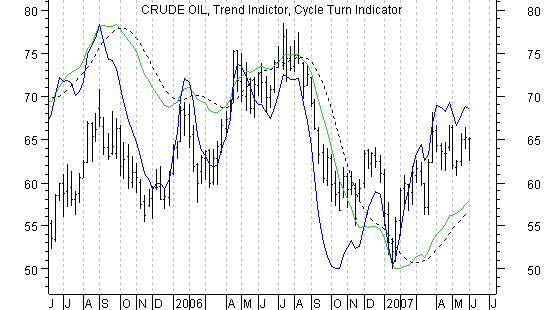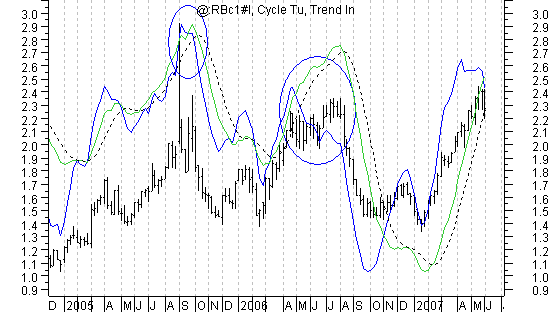Cycle Turn and Trend Indicators and a Look at Crude Oil and Gasoline
Commodities / Crude Oil Jun 02, 2007 - 12:45 PM GMTBy: Tim_Wood
 Earlier this past week I had intermediate-term sell signals on both crude oil and unleaded gasoline. Given that we are just now approaching the hurricane and summer driving seasons, I have to wonder if these signals are going to be brief or if they are discounting the season ahead and if lower energy prices truly lie ahead.
Earlier this past week I had intermediate-term sell signals on both crude oil and unleaded gasoline. Given that we are just now approaching the hurricane and summer driving seasons, I have to wonder if these signals are going to be brief or if they are discounting the season ahead and if lower energy prices truly lie ahead.
When technical analysts talk about support and resistance levels, cycles and chart patterns, the average person begins to lose consciousness, because these topics can be boring. However, through my Trend and Cycle Turn Indicator I have developed a method of identifying both the trend of the market as well as important turn points. In reality, all that really matters is the direction of these indicators as they do not care about the chart patterns, statistics, the fundamentals, the news reports, the Elliott wave count, or where support or resistance may or may not be. Basically, everything is subordinate to the indicators. All we have to do is simply follow the lines.
Without complicating things too much, I want to explain that I apply these indicators on a layered approach. The monthly charts for the longer-term work, the weekly charts are for the intermediate-term and the daily charts are for the short-term. If the monthly indicators are in agreement with the intermediate and short-term, then all three trends are moving in the same direction. When the intermediate or shorter-term degree is moving opposite to the larger degree, there is a crosscurrent and a counter trend move underway.
Robert Rhea once wrote, “ ….. it is hoped that readers will always remember that the “Primary” movement is entitled to perhaps 70 per cent of their attention; the “Secondary” to 20 per cent; and the “Minor” (Dow's third) movement to a scant 10 per cent. It is wise to learn to think of these three movements as being the Tide (primary), the Wave (secondary), and the Ripple (minor). The Tide (the primary trend) is the irresistible force which cannot be controlled, although its reach may be temporarily shortened by a receding Wave (a secondary reaction), and this Wave may be moving with or against the Tide. The Ripple (Dow's third movement) may be a part of the Tide or the Wave, moving with or against either. The ripple changes its tendency to ebb and flow with great frequency. It has an almost negligible effect on the Wave, and is but a minute factor where the Tide is concerned; nevertheless, an inquisitive individual, lacking other means of observation, might sometimes determine the hour and minute of the high tide by inserting a pencil in the sand at the highest point reached by successive waves and ripples. When successive movements failed to go above the pencil, then he might reasonably assume that the tide had turned. It is upon such empirical tests that Dow's theory is based.
In applying Rhea's analogy, my monthly analysis would equate to the “Tidal” or “Primary” movements. The weekly analysis is the “Wave” or “Secondary” movement, and the daily charts represent the “Ripples.” The Trend and Cycle Turn Indicators can help to guide us at all three levels.
If the indicators are moving up, then the trend or cycle in the underlying index is clearly moving up.
If the Trend Indicator is moving up but the Cycle Turn Indictor is moving down, then the market is in a counter trend correction. In other words, the higher degree is moving up while the lower degree is moving down.
By the same token, when both indicators are moving down, then the underlying cycle or trend of that degree is clearly down.
If the Trend Indicator is moving down and the Cycle Turn Indicator is moving up, then the higher degree is moving down and a counter trend bounce is at hand.
It's almost as simple as following these lines. In reality, I incorporate a few other factors into the equation, but for the purpose of this illustration, I will leave out the rules that I use for filtering. The purpose here is to show you a simple application of the Cycle Turn and Trend Indicators. More rules would just make a simple concept more confusing than it has to be.
To demonstrate this concept today we will be looking at the weekly charts, which is representative of the “Wave” or the “Secondary” movement. In the first chart below I have plotted a weekly chart of crude oil. The indicator in blue is my Cycle Turn Indicator and the one in green is my Trend Indicator. When the Trend Indicator is moving up and is above its trigger line, the intermediate-term trend is bullish and any down turn of the Cycle Turn Indicator is considered a counter-trend move.

As an example, the intermediate-term Cycle Turn Indicator turned up triggering a buy signal the week of January 26, 2007 . With the Trend Indicator moving down at the time that buy signal was initially considered a counter-trend move. But, as that advance evolved it turned the Trend Indicator up, which served to confirm that an intermediate-term trend change had indeed occurred. Note that in March and then twice in April the Cycle Turn Indicator turned down, but with the Trend Indicator still positive, these down turns were considered counter-trend. This now brings us to our present situation in which the Trend Indicator still remains positive, but once again the Cycle Turn Indicator has turned negative. So, at present the sell signal triggered by the down turn of the Cycle Turn Indicator is considered counter-trend. The key will be if enough weakness develops in the wake of this signal over the next few weeks to turn the Trend Indicator down. If so, then yes, we should have a much more meaningful top in place. But, on the other hand, if the Cycle Turn Indicator turns back up before the Trend Indicator turns down, then at that point crude oil will indeed be poised for still higher prices.
Next, I have included a weekly chart of unleaded gasoline. Here you can see that the Cycle Turn Indicator has been diverging with price much like it did at the top last summer as well as the 2005 top. In spite of the recent divergences the criteria for an intermediate-term sell signal were not met until this past week. So, in addition to an intermediate-term sell signal on crude oil, we also now have an intermediate-term sell signal in gasoline.

As is the current case with crude oil, the intermediate-term Trend Indicator remains positive on gasoline and the key here too, is whether or not enough weakness develops in the wake of this signal over the next few weeks to turn the Trend Indicator down. It is also important to understand that this same concept is applied to the monthly charts for a picture of the “Tidal” or “Primary” movements as well as the daily charts for a look at the “Ripples.”
It is possible that the bounce in crude oil and gasoline on Friday could evolve and trigger another intermediate-term buy signal. But, until it does, the existing intermediate-term sell remains intact. I have learned to simply follow the indicators at the various levels rather than to guess about what may or may not occur. But, if I were to guess about the future of oil and gasoline I would have to go with the current indicators which at present still suggest more corrective action until the weekly Cycle Turn Indicator turns back up. Once this correction has run its course, I look for another buy signal that will probably be associated with some event such as the usual summer hurricane in the Gulf. This should obviously cause another spike up in price. Then, depending on where that spike carries the price of oil and gasoline, we could begin seeing longer-term trend confirmations that will have even further reaching implications for quite some time to come.
I have begun doing free Friday market commentary that is available to everyone at www.cyclesman.com/Articles.htm so please begin joining me there. Should you be interested in analysis that provides intermediate-term turn points utilizing the Cycle Turn Indicator as well as coverage on the Dow theory, other price quantification methods and all the statistical data surrounding the 4-year cycle, then please visit www.cyclesman.com for more details.
By Tim Wood
Cyclesman.com
© 2007 Cycles News & Views; All Rights Reserved
Tim Wood specialises in Dow Theory and Cycles Analysis - Should you be interested in analysis that provides intermediate-term turn points utilizing the Cycle Turn Indicator as well as coverage on the Dow theory, other price quantification methods and all the statistical data surrounding the 4-year cycle, then please visit www.cyclesman.com for more details. A subscription includes access to the monthly issues of Cycles News & Views covering the stock market, the dollar, bonds and gold. I also cover other areas of interest at important turn points such as gasoline, oil, silver, the XAU and recently I have even covered corn. I also provide updates 3 times a week plus additional weekend updates on the Cycle Turn Indicator on most all areas of concern. I also give specific expectations for turn points of the short, intermediate and longer-term cycles based on historical quantification.
© 2005-2022 http://www.MarketOracle.co.uk - The Market Oracle is a FREE Daily Financial Markets Analysis & Forecasting online publication.


